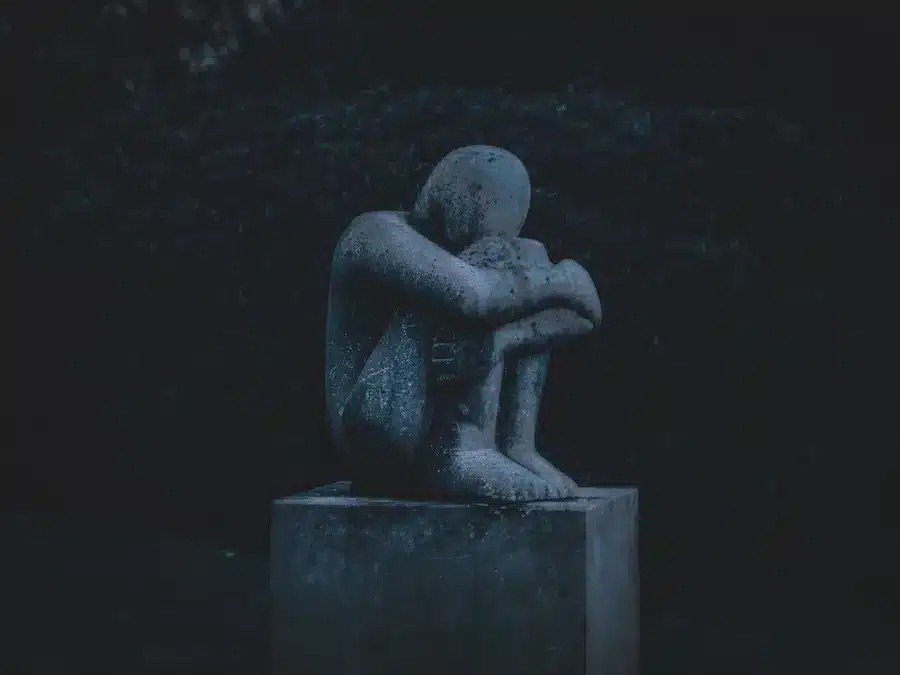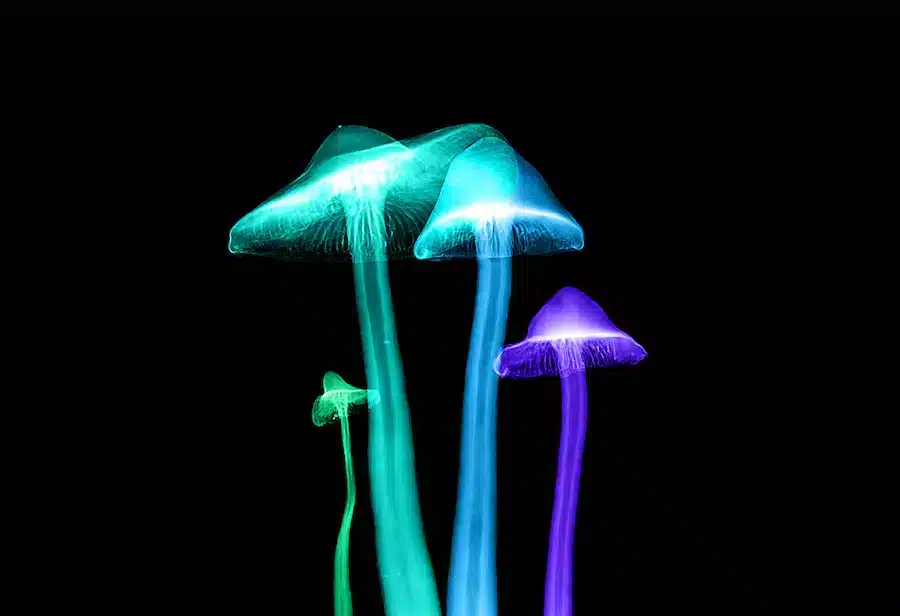Over 7% of the US population is affected by Major Depressive Disorder every year (National Institute of Mental Health “Major Depression”, 2017), and the World Health Organization stated it as the “third cause of the burden of disease worldwide” in 2008.
You likely know someone who has struggled with persistent depression or even succumbed to its drag in one way or another, and now more than ever, we are hoping to understand and combat this condition fully.
The psychedelic revolution (as some are calling it) is sparking intrigue in scientific communities, so the complexity of this condition is really being hit by all angles.
Because depression is complex and affects all aspects of the person inflicted, the condition likewise needs a holistic treatment approach, with psychedelic medicines like psilocybin (magic mushrooms), MDMA, and LSD being on the radar.
Psychedelics are known for their multi-leveled effects as experienced by the journeyer, from psychological to spiritual to physical, and the more research that emerges, the more hopeful these medicines appear.
This article explores depression in all its complexity, symptomatology, and the ways in which a facilitated psychedelic experience may be the next best step for those struggling.

The Symptoms of Complex Depression
Depression is a complex manifestation rooted in a diversity of influences, with an etiology intertwining biological, psychological, genetic, environmental, lifestyle, and cognitive factors.
It has interestingly become a buzzword, likely because of how easily it encompasses a wide and elusive variety of experiences, emotions, and thoughts.
Depression’s diverse array of symptoms impacts an individual’s entire well-being, and these symptoms often persist for an extended period, affecting daily functioning and overall quality of life.
Common symptoms associated with depression include:
- A pervasive feeling of sadness, emptiness, or a sense of hopelessness that persists most of the day, nearly every day.
- Marked decrease or loss of interest in activities or hobbies that were once enjoyable, leading to a diminished zest for life.
- Unexplained weight loss or gain, often accompanied by changes in appetite and eating patterns.
- Insomnia (difficulty falling or staying asleep) or hypersomnia (excessive sleeping), disrupting the regular sleep cycle.
- A constant feeling of tiredness, fatigue, and difficulty in carrying out even simple tasks.
- Persistent and irrational feelings of guilt, self-blame, or worthlessness, even when there’s no apparent reason.
- Challenges in focusing, making choices, or sustaining attention, often leading to decreased productivity and increased self-doubt.
- Observable physical restlessness or slowed movements and speech, noticeable by others.
- Thoughts of death, dying, or a desire to end one’s life, which should be taken very seriously and requires immediate professional help.
- Unexplained physical complaints such as headaches, muscle aches, stomachaches, or other bodily discomforts without a clear medical cause.
- A sense of emotional detachment or feeling emotionally numb, as if all emotions have been drained.
- Persistent negative thoughts about oneself, the future, or the world, accompanied by a bleak outlook on life.
As you can see, these symptoms range from physical to thought-based to emotional to behavioral, and depression’s causes are as diverse as its symptoms.
What Causes Depression?
Likely the most discussed causes of depression are biology and genetics, as we privilege this idea of a material cause, such as some imbalance or abnormality in the physical brain.
Neurotransmitters, neural circuits, neurochemistry…this ensemble of chemical messengers like serotonin, dopamine, and norepinephrine, orchestrates mood and emotional stability.
Disruptions in this delicate balance may underlie depressive states, but finding a cause-and-effect relationship has been as difficult as putting to rest the age-old philosophical debate of nature versus nurture.
Are brain abnormalities the original source of depression? Or are they co-occurring observations of some deeper manifestation? If we alter something about the brain, can we vanquish this illness once and for all?
Factors that contribute to the development of depression:
- Thought patterns and processes
- Traumatic life events and chronic stress
- Genetic and hereditary influences
- Environmental exposures such as toxins
- Physical health, chronic illness, and chronic pain
- Lifestyle and behavioral activities
- Substance abuse and addiction
- Self-neglect or a sedentary lifestyle (poor diet and lack of exercise)
- Lack of resources or access to resources
Whether we solve this debate now or not, it is undeniable that particular observable neurochemistry and activity is associated with depressive symptoms.
Seeking psychedelic assisted therapy?
We'll walk you through every step of the process after getting to know you and your unique needs. Book your consultation call for $49 and we’ll connect you to a trusted provider.
The Latest Psychedelic Research on Depression & The Brain
When it comes to the brain and psychedelics, one notable element which has been linked to depressive symptoms is an over-activity in the neural network called the Default Mode Network (DMN).
This collection of brain regions is active during rest and introspective, self-referential thought, and is associated with rumination, negative self-reflection and recurring thoughts about one’s problems or shortcomings in those with depression.
More generally, this network in the brain is most active when the individual is daydreaming, resting but still awake, thinking of others or the self, and thinking of the past or the future.
Parts of the brain associated with the DMN include the medial prefrontal cortex, posterior cingulate cortex, precuneus, and angular gyrus.
One interesting theory around the DMN is that it potentially acts as the “basis for the self” (Wikipedia, 2023), however its involvement in contemplation around others, the past, and the future may point to another theory.
The common link amongst those elements is non-presence. When we reflect and ruminate, we are able to generate concept and narrative. Being stuck in this state, however, zaps us of our lived experience in the moment, which is the seat of sensation.
Then it makes sense that in those with depression, life feels muted, the ability to feel pleasure is missing, and our connection to the world around us feels severed.
Psychedelics, however, seem to induce a dampening effect on the DMN and even shut down the majority of DMN activity during the psychedelic experience.
To temporarily shut off this mechanism in the brain might be linked to what trippers call “ego dissolution” or “ego death,” and helps the journeyer tap into a transcendent, unified awareness of oneness with one’s environment.
This temporary alteration in DMN activity might play a crucial role in disrupting rigid thought patterns and promoting a shift in perspective, catalyzing profound, transcendent healing.
One study which analyzed self-reported effects of psilocybin on participants with Major Depressive Disorder found that psilocybin had profound benefits on depressive symptoms.
The study was re-evaluated recently in 2022 to consider potential benefits after a longer duration post-treatment.
“Psilocybin-assisted treatment for MDD produces large and stable antidepressant effects throughout at least 12 months after treatment” (Gukasyan et al., 2022).
In another 2022 release, two trials took place assessing the brain’s function after psilocybin treatment on depressive patients.
“We assessed the subacute impact of psilocybin on brain function in two clinical trials of depression. The first was an open-label trial of orally administered psilocybin…in patients with treatment-resistant depression…
The second trial was a double-blind phase II randomized controlled trial comparing psilocybin therapy with escitalopram” (Daws et al.).
“In both trials, the antidepressant response to psilocybin was rapid, sustained and correlated with decreases in fMRI brain network modularity, implying that psilocybin’s antidepressant action may depend on a global increase in brain network integration.”
Important to note is that often in these studies, while lasting change has been observed (as shown in Gukasyan and colleagues’ study), it is possible for the brain to revert back to old patterns after a period of time post-treatment (Kurtzman, 2022).
While there is always room for more research, depression is one condition that has been extensively studied as of this year, and all signs point to profound therapeutic and antidepressant potential.

How Psychedelics Can Be Used in the Treatment of Depression: Psychedelic Therapy Near Me
Given the severity and fragility of the depressive state, it’s pertinent to handle any approaches to treatment with the utmost care and caution.
That is why throughout the therapeutic use of psychedelics, having the right support and container can make such a massive difference in the outcome and quality of the experience.
A facilitated psychedelic journey privileges safety, proper setting, and adequate preparation, and the presence of a professional guide helps manage potential anxiety and apprehensions.
Here at Psychedelic Passage, we connect you with a network of psychedelic guides and experts located all over the country, which makes the process all the more stress-free and convenient.
Our network is pre-vetted, with the highest standards of reputability and experience in mind, and not only do they offer support leading up to the journey and during the journey itself, but also through the integration stage as well.
This allows you to delve into your healing process with a greater sense of security, knowing that you have reassurance, guidance, and techniques to manage challenging moments at your disposal.
If you are interested in exploring psychedelics in a supported, intentional way, we encourage you to use all of our resources thoroughly before embarking on a psychedelic journey. You can find more information in the section below.
Connect With Our Network of Trusted Psychedelic Guides
Hi there! We sincerely hope that you’ve found valuable takeaways that resonate with your current intentions. To explore research-based education, stay updated with psychedelic news, and benefit from practical how-to articles, we encourage you to head over to our resources page.
If you’re seeking personalized advice and are prepared to take the first step toward a therapeutic psychedelic experience, we invite you to book a consultation with our team of experienced psychedelic concierges.
This consultation is more than just a conversation; it’s an opportunity to be matched with a trustworthy local facilitator. You’ll be seamlessly connected to our rigorously vetted network of psychedelic guides, ensuring potential matches align with your needs.
Psychedelic Passage offers confidence and peace of mind by alleviating the burden of having to guess who’s right for you. If you want to discover how Psychedelic Passage can help you, we empower you to learn more about our services and check out client testimonials from those who’ve gone before you.
Your healing path is uniquely yours, and our commitment is to serve you at every juncture. Psychedelic Passage: Your Psychedelic Concierge — The easy, legal way to find trustworthy psilocybin guides, facilitators and psychedelic assisted therapy near you in the United States.
More Psychedelic Passage
-
- Listen to our podcast on Spotify, Apple Podcasts, and iHeartRadio
- Subscribe to our Youtube Channel
- Follow us on Instagram, Reddit, Twitter, and Linked in for bite-sized updates and content.


